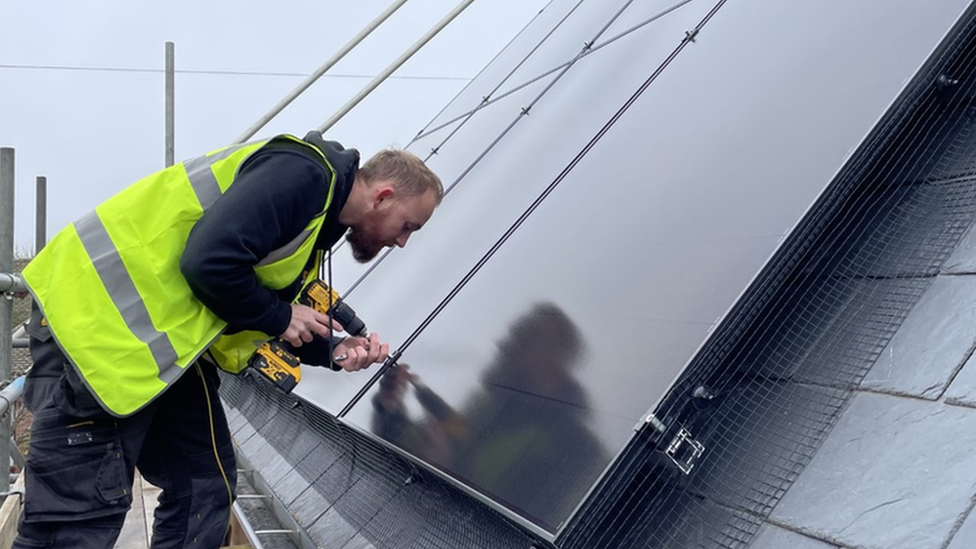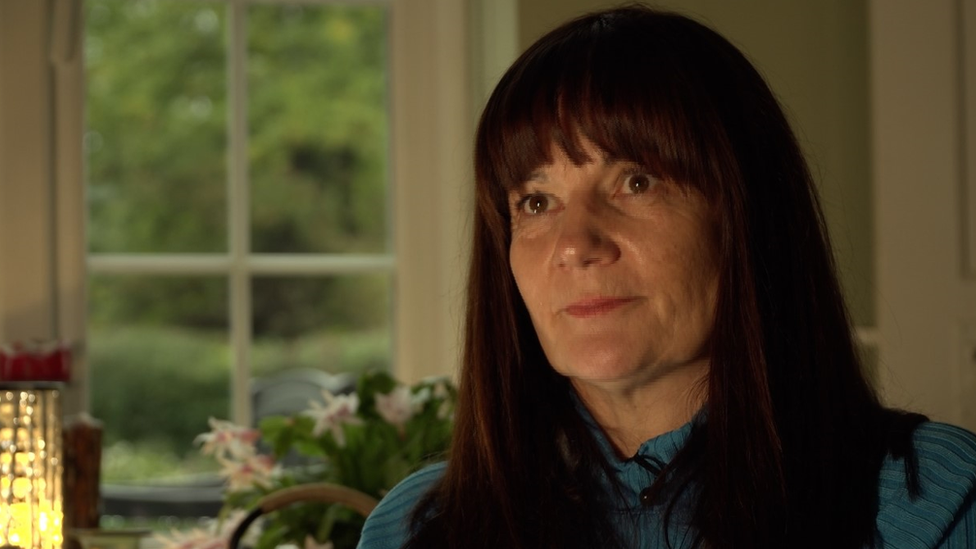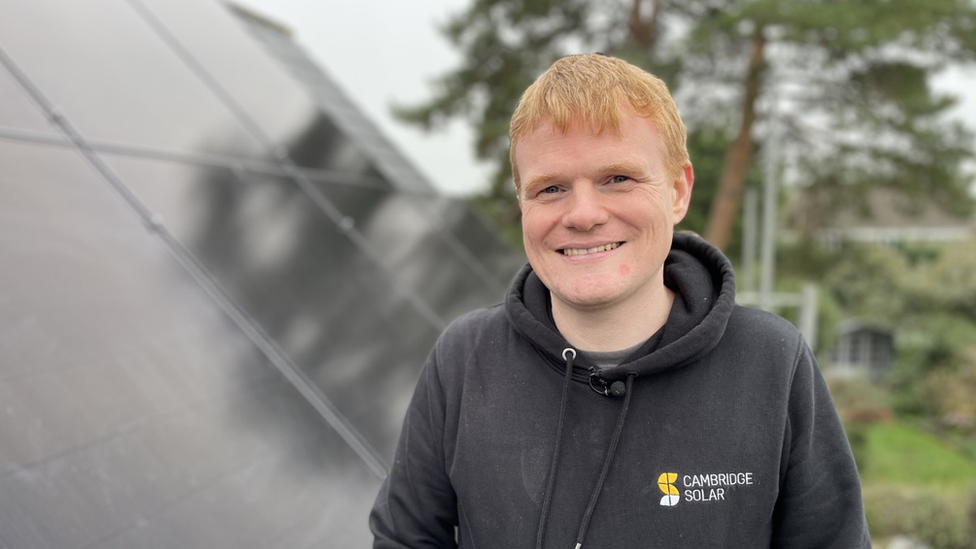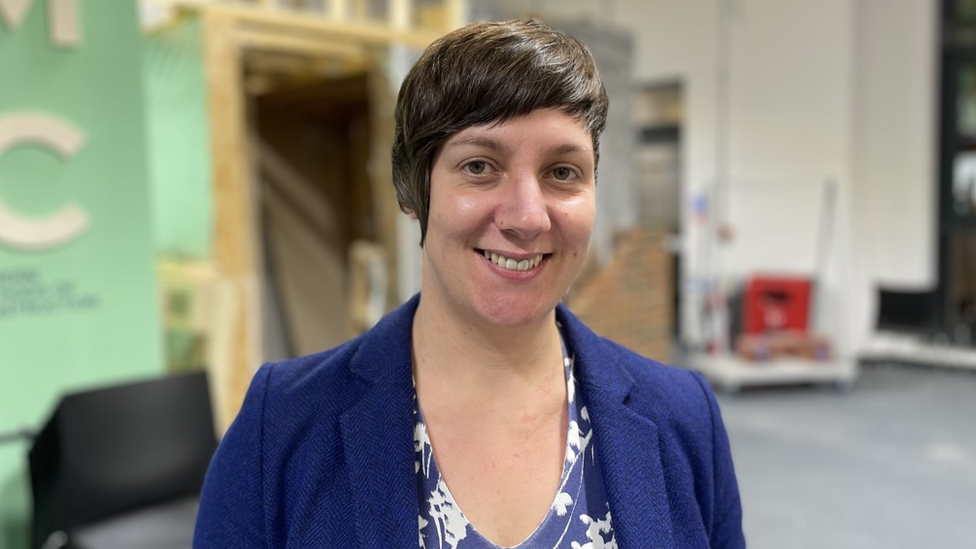Net zero homes need £150bn and workforce of 46,000
- Published

More than 46,000 workers and £150bn are needed in the South East to make homes meet government climate targets, according to a new analysis.
Lack of skilled tradespeople led to £53m of grant funding being returned to the government earlier this year.
Colleges are now redesigning courses to include more energy efficiency and retro-fit skills.
The business and energy minister said the government was helping train thousands more skilled installers.
Reducing energy demand in buildings is, according to the Climate Change Committee, "the biggest gap in current government energy policy", external.
Grant funding of £78m had been given to the Greater South East Net Zero Hub, external, which works with Local Enterprise Partnerships from Hampshire to Norfolk and Kent to Northamptonshire. The project ran from March to September this year.
It hoped to use the money to help install energy efficiency measures, including insulation, heat pumps and solar panels, to 7,500 homes in fuel poverty in its area, but only managed to fund 1,750.
The unspent money was returned to central government.
'Incredibly disappointing'
Maxine Narburgh, who leads the hub, said: "We were allocated £78m and we weren't able to spend all of that funding because we did not have enough installers with capacity to deliver in the region.
"It was incredibly disappointing. We're here to support people to get more efficient homes. There was funding available to improve those homes, but just not enough people to deliver that for us."
She added that part of the problem was their project overlapping with another run by councils, but there is also a large skills gap.
"We have around 29 million homes in the UK that need to have energy efficiency measures, low carbon heating and solar installed by 2050," Ms Narburgh added. "That is going to need a very large workforce."

Maxine Narburgh from the Greater South East Net Zero hub says the skills gap is an "opportunity" to create jobs
The scale of the task was, she said, a "great opportunity" and would "create jobs".
The government wants the UK to move to net zero CO2 emissions by 2050 and is considering phasing in higher minimum energy efficiency standards for homes by 2035.
According to the Energy Systems Catapult, upgrading 10 million homes across the greater south east to net zero will need 46,500 full time workers.
A report published this week adds that because workers will not necessarily work full-time on new installations, the total workforce trained in retro-fitting needs to be 100,000 and up to 200,000 at peak times.
It also estimates more than 500,000 training courses will be needed.
Some Local Enterprise Partnerships, including New Anglia LEP in Norfolk and Suffolk, are offering publicly-funded skills boot camps, external in "green skills", including retrofitting.
Demand 'through the roof'
Owen Morgan, who runs solar panel installer Cambridge Solar, said in the 13 years since the business began demand has never been so high.
New customers will be waiting around six months before panels can be fitted, he said.
The industry is experiencing delays sourcing some components, including batteries and panels, as well as securing staff.
He said: "Demand... for solar panel installations is through the roof."

Owen Morgan, who runs Cambridge Solar, said there was a six-month wait to have solar panels installed and securing skilled staff is difficult
He added that finding skilled installers was "difficult and expensive".
"There's a lot of demand for those skills," he said. "We've been searching for electricians for months and months.
"It's really difficult to find experienced people; there is a shortage of them. What we've tended to do is to is to train people up in-house with our teams."
Focus on net zero skills

Students will eventually learn retrofit skills like solar panel installation using virtual reality technology
The West Herts College group is training lecturers in net zero skills, using £5m of government funding.
It is working with 10 colleges in Hertfordshire, Bedfordshire, Milton Keynes and Northamptonshire to update their curriculum.
From January, students will be able to learn how to install solar panels, heat pumps and electric vehicle charging points.
Some of the course content, like accessing roofs for solar panels, will be taught using virtual reality technology.
Amanda Washbrook, the college's director of curriculum, said: "It's a big change in terms of focus. At the moment people are looking at really quite old fashioned ways of doing things, but ways of doing things that we've used for decades, which now quite rapidly need to be replaced with new solutions."

Amanda Washbrook says the new curriculum will be rolled out from January
She added that forecasts say there is an "urgent" need to develop new skills.
"Let's say electric vehicle chargers, where you look at the number of electric vehicle chargers that need to be put in, there just aren't the installers qualified at the moment to do that," she said.
"So if we all start buying electric vehicles there will be a problem with people waiting a long time to get those chargers installed in their houses or waiting a long time for installations of chargers in public places that they'd be able to use."
The Department for Business, Energy and Industrial Strategy has announced £9.6m funding for 8,900 training courses in heat pump and energy efficiency installations.
The Business and Energy Minister Lord Callanan said: "The green energy sector is driving growth and creating jobs right across the country, and this funding will make sure we have enough tradespeople trained up and able to take advantage of these opportunities.
"We are making homes greener and cheaper to keep warm and training thousands more skilled installers will ensure we keep accelerating the pace of creating cleaner and more energy efficient buildings."
The government said it was "accelerating the pace of upgrading the energy efficiency of housing" with £6bn of funding committed to 2028, in addition to £6.6bn over the current parliament.

Find BBC News: East of England on Facebook, external, Instagram, external and Twitter, external. If you have a story suggestion email eastofenglandnews@bbc.co.uk, external